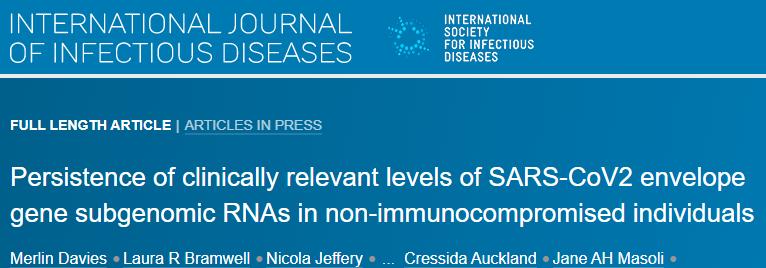This article is reproduced from the "Medical Novi" WeChat public account.
The new crown virus, which usually infects humans through the respiratory tract, causes damage to the respiratory system and various organs of the human body. Since the first outbreak at the end of 2019, the new coronavirus is still raging around the world, causing a great negative impact on the world economy and society.
The rapid replication speed of the new crown virus, the wide range of viral cells, and the high vitality in the environment are the main biological factors that spread rapidly and are difficult to control. So, if a person is infected with the virus, how long does it take to isolate to be completely unintagious?
Researchers at the University of Exeter School of Medicine recently published an article in the International Journal of Infectious Diseases titled "Persistence of clinically relevant levels of SARS-CoV2 envelope gene subgenomic RNAs in non-immunocompromised." individuals" research papers.
The study showed that 13 percent of people are still likely to be contagious after 10 days of isolation, and some people can retain infectivity for up to 68 days.

Research Results (Source: International Journal of Infectious Diseases)
Traditional PCR is to determine whether someone has recently contracted the virus by testing for the presence of a fragment of the virus, but it is impossible to detect whether the virus is still active and whether the person is contagious. However, the test used in the new study will only give a positive result if the virus is active and likely to continue to spread.
In the study, the researchers analyzed 176 people who had recovered from COVID-19, measured all participants using subgenomic RNA and E genome sequences, analyzed the association between COVID-19 severity and active viral load, and then assessed viral clearance kinetics in relation to symptom onset and last positive test.
Participants were classified for severity as asymptomatic, mild, moderate, severe, or critical.
The results showed that even after 10 days of isolation, 13 percent of people still showed a clinically relevant level of the virus, meaning they could still transmit the virus to others and could retain infectivity for up to 68 days.
The dynamics of viral load loss in samples (Source: International Journal of Infectious Diseases)
The researchers say the new test should be applied to people's susceptible environments so that the spread of COVID-19 can be stopped.
The researchers note that although this is a relatively small study, the results suggest that the potentially active virus can sometimes persist for more than 10 days and may pose a potential risk of continued transmission.
Cross-sectional analysis of virus clearance (Source: International Journal of Infectious Diseases)
In addition, there is nothing clinically special about these people carrying potentially active viruses, which means we cannot predict who they are. The study also confirmed previous observations that the duration of infection varies from person to person, and that some people can last a long time to be contagious.
Taken together, the study shows that even after 10 days of isolation, a subset of people are still contagious, which could pose a serious public health risk.
The researchers stress that we may need to make sure that people in those environments test negative for the virus to ensure that people are no longer contagious. We now want to conduct larger trials to investigate this further.
End
Resources:
[1] Davies M, Bramwell LR, Jeffery N, et al. Persistence of clinically-relevant levels of SARS-CoV2 envelope gene subgenomic RNAs in non-immunocompromised individuals. Int J Infect Dis. 2021 Dec 7:S1201-9712(21)01206-6. doi: 10.1016/j.ijid.2021.12.312. Epub ahead of print. PMID: 34890790.